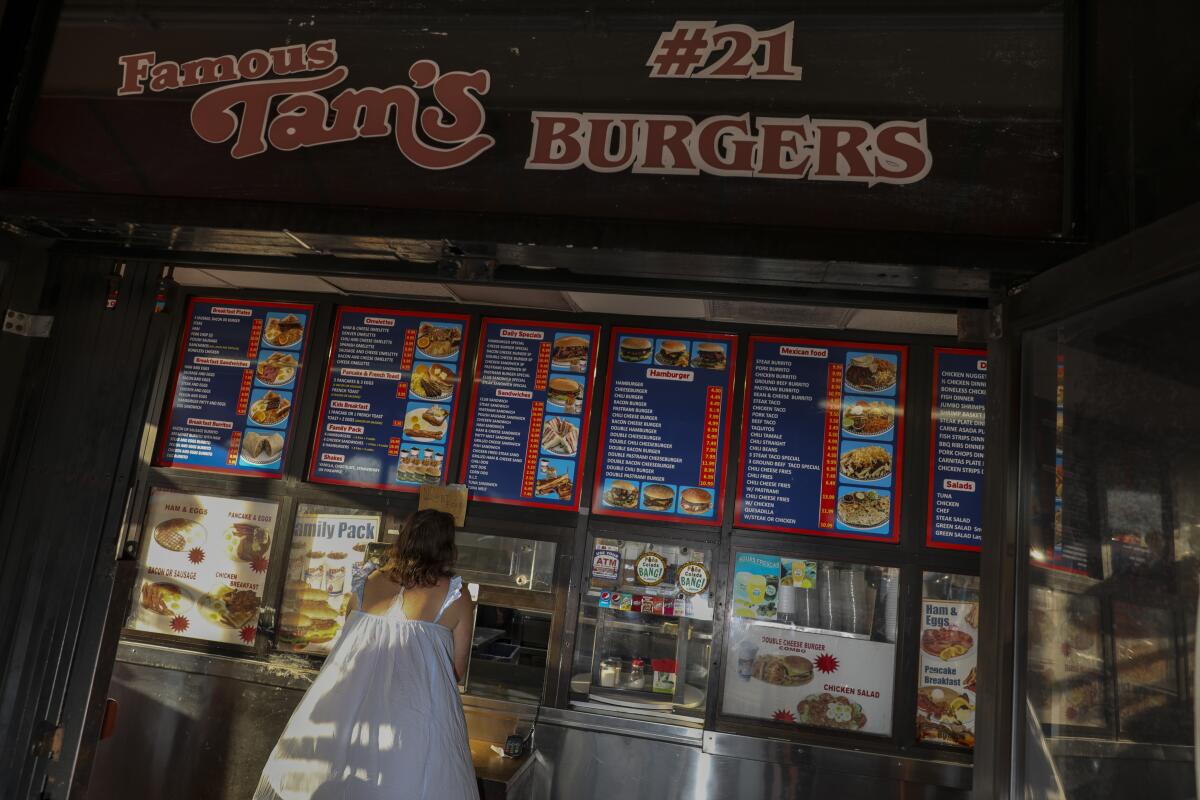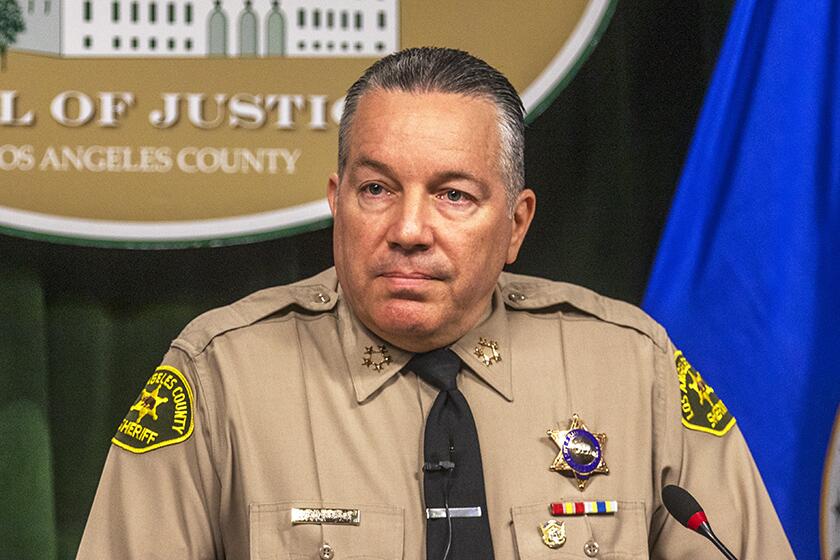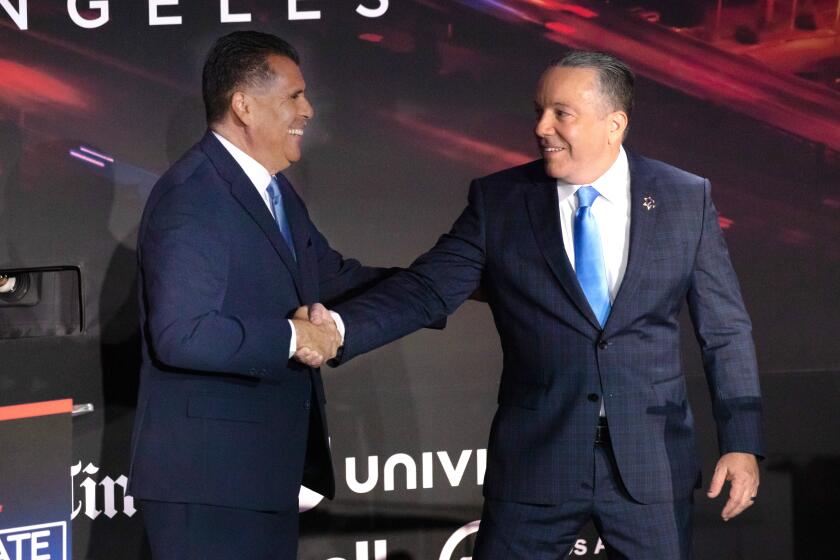Burger chain manager fined for using ‘straw donors’ to back ex-Sheriff Alex Villanueva’s 2018 campaign

- Share via
A burger chain manager accused of using “straw donors” to repeatedly contribute to former Los Angeles County Sheriff Alex Villanueva’s 2018 bid for office has agreed to pay a $50,000 fine for campaign money laundering, according to the California Fair Political Practices Commission.
The state watchdog said in a January filing that investigators found no evidence Villanueva knew about the money laundering scheme. But commission records show the former sheriff, his 2018 campaign and his then-campaign treasurer agreed to pay a total of $7,500 for violating reporting requirements and failing to return some of the money.
Under the settlement, which the commission will formally vote on later this month, burger chain manager Manuel Gomez will admit guilt to 10 counts of campaign money laundering.
The other three parties — Villanueva, his treasurer and his campaign — will admit guilt to two counts related to reporting omissions. Attorneys for Gomez and the former campaign treasurer, Cine Ivery, did not respond to requests for comment. Brian Hildreth, who represents Villanueva, said the language of the agreement made it “crystal clear” that Villanueva did not know about the scheme.
A spokesman for the FPPC said the commission does not comment on pending cases. If the proposed agreement is approved, commission filings show, it will be the first time since 2017 that the commission has approved a settlement involving multiple counts of campaign money laundering.
Alex Villanueva’s change of heart comes days after a judge set a hearing on whether to order him to testify on deputy gangs within the Los Angeles County Sheriff’s Department.
The complaint that spurred the investigation was filed in October 2018. At that point, Los Angeles County’s local limits barred individual donors from contributing more than $1,500 to a campaign in a single calendar year. The complaint highlighted a handful of donations made by various Tam’s Super Burgers locations, along with several cooks and waiters who worked there.
“The fact that multiple hourly employees of Tam’s Super Burgers and other related businesses have made maximum $1,500 contributions to Villanueva’s campaign suggests that the employees are being incentivized to contribute to Villanueva, including the possibility that the businesses are reimbursing employees for their political contributions,” the unsigned complaint alleged.
Both the initial complaint and a similar one filed days later raised concerns that the business owner — then a reserve deputy and previously a supporter of former Sheriff Lee Baca — and the Villanueva campaign may have violated the state’s Political Reform Act.
Around that same time, the L.A. County district attorney’s office opened an investigation after receiving a complaint from the campaign of Villanueva’s opponent, then-Sheriff Jim McDonnell. After interviewing several donors and obtaining warrants for nearly two dozen bank accounts, prosecutors said in a memo that they found no evidence that the burger chain’s owner committed a crime. However, some employees told investigators that they had been asked to donate by their boss — Gomez.
Investigators searched Gomez’s home in 2019 and found items related to the Villanueva campaign, but nothing that prosecutors deemed incriminating. In the spring of 2022, the district attorney’s office decided not to prosecute the case. Prosecutors said the statute of limitations had expired for several possible charges and most of the donors had said they were only encouraged to donate but that Gomez did not give them money to do so.
Lt. Shawn O’Donnell’s lawsuit accuses Sheriff Robert Luna of overseeing retaliation against those who supported his predecessor in the 2022 election.
The state commission, however, continued with its case. According to the proposed settlement, which a commission spokesman said is based on agreements from all parties, Gomez maxed out his own donations to Villanueva’s campaign with a $1,500 contribution in August 2018. Then, investigators found, he donated 14 more times using his employees, friends and family as intermediaries, or “straw donors,” whom he supplied with cash.
“Many of the intermediaries could not speak English,” the agreed settlement says. “Some could not write in English. Nearly all of the contribution checks were filled out in the handwriting of Gomez.”
The 14 donations under other people’s names totaled $21,000, according to commission records.
Though Villanueva’s campaign reported Gomez’s initial contribution, the pre-election campaign statement left out key information required by law, including the occupation and employer fields. That information, the settlement said, “would have helped illustrate the relationship” between Gomez and the workers who donated to Villanueva.
Whenever that information is missing for a donor, candidates are required to return the contribution within 60 days, something the Villanueva campaign failed to do with Gomez’s donation and one other.
Sheriff Robert Luna has been in office nearly a year. His tenure is calmer than his controversial predecessor’s, but critics question his track record. He talks to The Times.
“Although most of the laundered checks were written in the handwriting of Gomez, and many of the intermediaries who acted as ‘maxed out’ contributors were reported on Villanueva’s campaign filings as cooks/cashiers at burger restaurants — and as waiters — Villanueva and Ivery claim they did not know any funds were laundered,” the settlement says. “Consistent with this, the checks were received during a very busy time: the last few months before the general election, when many other contributions were being received.”
In a Tuesday evening email to The Times, Villanueva reiterated his lack of awareness about the source of the money.
“Unfortunately, we were victims as well due to the actions of the individual involved,” he wrote. “It was disappointing to hear the D.A.‘s office sat on this case for five years, as we were denied the opportunity to address the clerical error in a timely manner.”
The agreed settlement is on the commission’s Jan. 18 meeting agenda, at which point the five-member panel is expected to approve it. According to the commission spokesman, the proposed penalties would have already been paid.
More to Read
Sign up for Essential California
The most important California stories and recommendations in your inbox every morning.
You may occasionally receive promotional content from the Los Angeles Times.














